#Jesus on the Way to Jerusalem
Link
After twice completing routes on the challenging Way of Santiago (Camino de Santiago), which attracts people of all ages from around the world, Golan Reiss had one question in his mind.
Why didn’t the Holy Land, a magnet for spiritual travelers over the centuries, have an official pilgrim’s route that could end on a spectacularly high note in the city of three faiths, Jerusalem?
Reiss acknowledges Israel’s Jesus Trail (a 40-kilometer route tracing Jesus’ footsteps in the Galilee region) and the Israel National Trail, but says these focus mainly on hiking in nature.
What Reiss and his partner in the project, Yael Tersiuk-Nevo, started to map out seven months ago is a 400km route, The Way to Jerusalem, based on ancient Holy Land pilgrimages.
As Reiss explains to ISRAEL21c, “this is a journey which exposes you to the tremendous power that comes from a long, physical walk through history, characters and symbols and always ends in a significant place. In addition to this physical path, and no less important, is the inner path pilgrims undertake.”
The spiritual path, he adds, “is something everyone makes on their own and does in his own way. It’s not an Israeli way or our way, but something very personal.”
12 notes
·
View notes
Text
youtube
#bible prophecy endtimes#end times#endtimes#jesus is coming#bibleprophecy#youtube#faith in jesus#follow jesus#time is running out#spread the word#god forgive#praise be to god#sin of pride#sins of the lgbtq#days of lot#debased mind#woe to america#days of noah#pestilence#birth pangs#signs of the end times#wars and rumors of wars#jesus is returning#rapture of the church#jesus is the way#stand fast in the faith#god save our children#jerusalem#end of days#repent
0 notes
Text
To follow up on my Hosanna poll, I think before things go any further, it'd be good to actually explain and define it. I was initially going to wait until the end of the poll, but it seems that google is giving people a lot of bad and/or conflicting answers and I'd rather people walk away with the correct information.
So! Hosanna is an anglicized version of the Hebrew words "hosha na" [הושע נא or as a contraction הושענא]. Hosha na is a little enigmatic and hard to translate, but the simplest translation is probably "save us, please." It's traditionally used as an exclamation to G-d to rescue us, but it also has shades of being a triumphant shout (the implication being confidence that G-d will save us.)
Jews say "hoshanot" (the plural of hosha na) as part of our traditional Sukkot liturgy, and is something we do still today.
For us, the multi-faceted meaning of the root word allows us to have multiple layers of meaning. During Sukkot, we start praying for rain in its proper season and amounts, and we shake the lulav and etrog as part of these processions and liturgy. On Hoshana Rabba [the "great hoshana"], the last day of Sukkot, we process around the bimah (front lectern) seven times as a completion of our season of repentance and our starting of the new year with abundant blessings.
My siddur (prayer book) Lev Shalem has this as an explanation and translation:
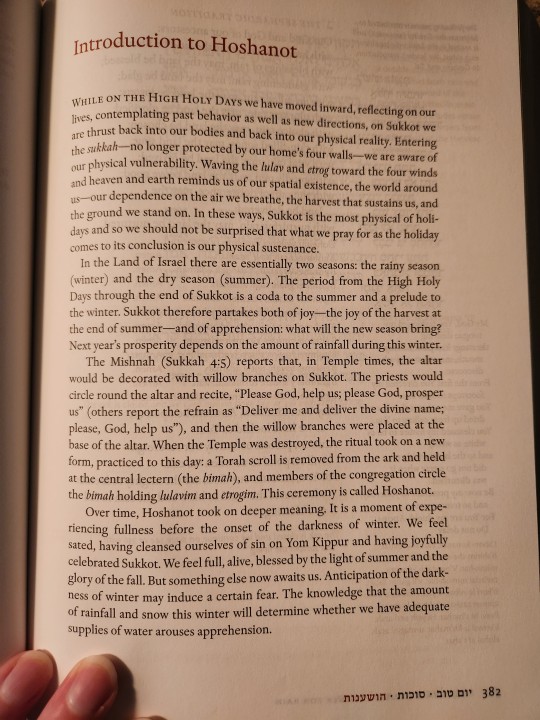
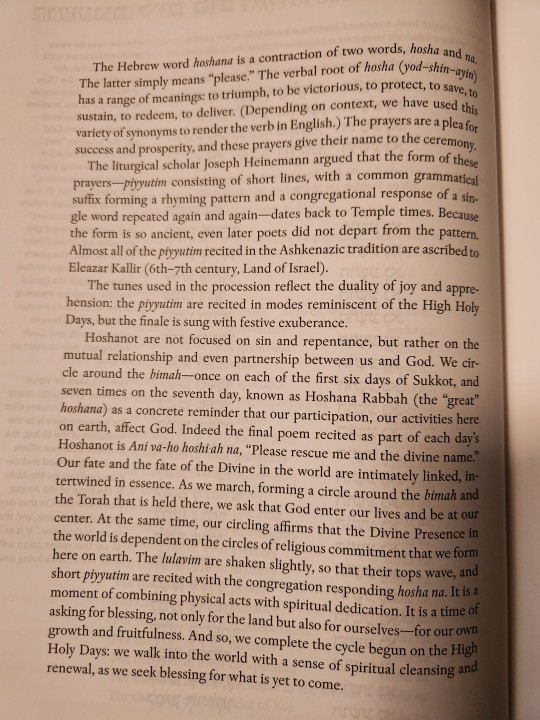
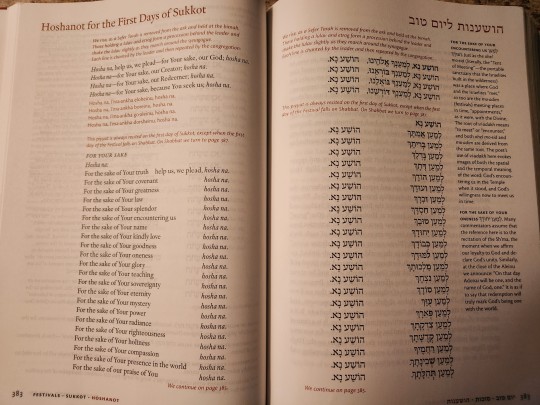
[Image ID is of the Lev Shalem siddur, pages 382 & 383 - I tried hard to find a pdf of this that would be readable using a screen reader, but the versions I'm finding cut off at pg. 376 at the latest. If anyone has bandwidth to type this up, I would greatly appreciate it]
For the curious, here is a recording of the Hoshanot liturgy and procession:
youtube
Christians mostly know the word from the gospels and hymns.
Here is what Wikipedia says about its use in Christianity:
Historical meaning
Since those welcoming Jesus were Jewish, as of course Jesus himself was, some would interpret the cry of "Hosanna" on the entry of Jesus in its proper meaning, as a cry by the people for salvation and rescue.
Christian reinterpretation
"Hosanna" many interpret as a shout of praise or adoration made in recognition of the messiahship of Jesus on his entry into Jerusalem
It is applied in numerous verses of the New Testament, including "Hosanna! blessed is the one who comes in the name of the Lᴏʀᴅ!" (Matthew 21:9,15; Mark 11:9–10; John 12:13), which forms part of the Sanctus prayer; "hosanna in the highest" (Mark 11.10); and "hosanna to the Son of David" (Matt 21:9). These quotations, however, are of words in the Jewish Psalm 118. Although not used in the book of Luke, the testimony of Jesus' entry into Jerusalem is recorded in Luke 19.
In church music
The "Hosanna Anthem", based on the phrase Hosanna, is a traditional Moravian Church anthem written by Bishop Christian Gregor of Herrnhut sung on Palm Sunday and the first Sunday of Advent. It is antiphonal, i.e. a call-and-response song; traditionally, it is sung between the children and adult congregation, though it is not unheard of for it to be done in other ways, such as between choir and congregation, or played between trombone choirs.
The bottom line:
Jews and Christians have different connections, associations, and meanings attached to this word as expressions of our different theologies and texts. The word is derived from a Hebrew word and was created by Jews and is still used by us today. (Like literally today - we are currently in the middle of the Sukkot festival.) Christians changed the meaning to fit within their own context, and pronunciation of the word evolved with linguistic drift over time. In the same way that there's not a reason to pitch a fit over saying Jesus rather than Yeshua, there's no compelling reason to change hosanna back to hosha na; if anything, the distinction helps make it clear that it's effectively a different word and concept from ours.
On the other hand, I do think Christians ought to know the original meaning of the word if they're going to use it. To only ever know their version when it was derived from ours is yet another small way of playing into supercessionism by erasing and replacing the Jewish context of things that were originated in Judaism that Christians have embedded in Christianity. While the Christians of today cannot unwind the supercessionism of Christian history, they *can* choose to understand their present Christianity in ways that do not play into supercessionism and that respect the Jewish community of today.
I hope this was helpful and gives folks a new perspective on an obscure Hebrew word!
473 notes
·
View notes
Note
hi, i'm a christian and i dont really have anyone to talk about the war with; and right now i am in support of palestine; a lot of people in my religion support israel/are neutral but i am really unsure because palestine has its faults but israel is committing literal genocide and thats not fucking okay; please guide me into understanding i hope this isn't offensive in any way
It sounds like you've got your answer already. Being against most people around you might feel like you're betraying your community for some odd reason. It doesn't make much sense but it happens. Palestine is Jesus' birthplace and Jerusalem is a holy site for all Abrahamic religions. I mean, I don't think you should have a religious reason to fight against genocide but if you really need a new perspective, that's all i can offer.
I've always questioned my own stance on issues but when it comes to Israel & Palestine, it's always been so easy. Children are being killed, stray cats and dogs. Mothers & fathers starved. It doesn't get any purer than a child. I suggest reading palestinian stories & being more involved so you can clear the remaining doubts in your head. Wish you the best.
here's a little song
121 notes
·
View notes
Text

Saint John the Baptist
Died: 30 AD
Feast day: June 24 (birth) August 29 (death)
John the Baptist was the son of Zachary and Elizabeth and cousin of Jesus. John began his ministry around age 27, preaching a message of repentance to the people of Jerusalem. He converted many and prepared the way for the coming of Jesus. He Baptized Christ, after which he stepped away and told his disciples to follow Jesus. Imprisoned by King Herod and was beheaded.
Prints, plaques & holy cards available for purchase here: (website)
121 notes
·
View notes
Text
Of course they say Jesus was Palestinian. Acknowledging that he was a Jew means acknowledging Jews lived in Judea. Acknowledging Jews lived in Judea means acknowleding Jews worshipped at the Temple in Jerusalem 2000 yrs ago Acknowledging Jews worshiped at the Temple in Jerusalem 2000 yrs ago means acknowledging Jewish indigeneity way before Arabs came from Arabia Acknowledging Jewish indigeneity acknowledges Jewish rights in this land Acknowledging Jewish rights in this land is a big no-no for Jew haters, antiZionists and terror supporters. Hence, Jesus was Palestinian and history doesn't matter. Merry Christmas
Shoshanna Keats Jaskoll
204 notes
·
View notes
Text
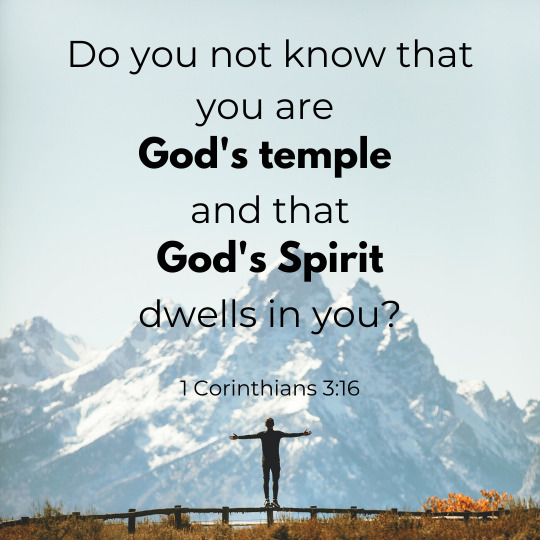
“What does 1 Corinthians 3:16 mean?” By Bibleref.com:
“Verse Commentary: This verse creates the third metaphors that Paul uses to describe the local church in Corinth. First, he compared them to a field being planted and watered by himself and Apollos as God's workers (1 Corinthians 3:5–9). Then, he compared their community of Christians to a building being constructed on top of the foundation of Jesus Christ by other teachers and leaders (1 Corinthians 3:10–15).
Now Paul compares them to the temple of God. The word for "you" here is plural, not singular. He is asking his readers, as the local church in Corinth, if they understand that they together are God's temple and that God's Spirit lives in them.
This would likely have been an unusual idea to those living in this area. Those who had seen it would likely have pictured the massive, sprawling Jewish temple in Jerusalem, truly an impressive structure. By comparison, the church in Corinth likely had no building of their own, meeting instead in smaller groups in the homes of various members. How could they possibly be God's temple?
Paul's answer is to the point: God's Spirit lives in them (1 Corinthians 2:12; 6:19). To be clear, God's Spirit lives in each believer individually, but Paul shows here that in this way the Holy Spirit occupies the collected believers known as the church. Thus, they become the temple of God, even without a physical structure to meet in. As Christians often say, "the church" is the people, not the building.”
Amen! 🙏🕊️🙌
#bibleref.com#bible#bible study#christian blog#god#belief in god#faith in god#jesus#belief in jesus#faith in jesus#1 corinthians 3:16#encouragement#keep the faith#make him known#biblequotes
165 notes
·
View notes
Text
Things that made me happy (or sad) from The Chosen s4
Calling Simon Peter! – man, chills, literally chills.
And the Matthew and Jesus talk. I liked how Matthew was open with his emotions and then learned something from it.
Jesus' words: I make people what they aren't. Yes, Jesus, please make me what I'm not. Only You are able to.
This being said – Matthew apologizing to Peter and then Simon Peter forgiving Matthew. A m a z i n g. The hug? Te relief on Matthew's face? The Peter's growth? I can see him being a leader.
Jesus always noticing the rejected ones – the blind man. Sure, he had friends (they were talking with Jesus) but the way he was sitting on stairs to the Temple and nobody gave him a second glance, but Jesus did.
I've never been to a wedding banquet, but I'm on my way to one. and then You wouldn't get it. These are your last words?
Some comic relief scenes: poor Matthew not understanding some things (and I get it, believe me, I do) as Andrew telling him he should write request on paper to speak with Peter or lifting his hand when pharisee asked who's writing Jesus' words down. Or Nathaniel? This man is hilarious. Not wanting to be chaperon for Thomas and Remah but telling John he won't be reliabe one to do it himself. Or questioning other followers' skills with pomegranates. Idk, I was laughing so hard.
Gaius. Oh my. I don't even know where to start. I loved his story. I loved how big his faith was. I loved how he cared about Matthew from the very begining. And he wanted to go to Jerusalem for Passover! I wonder how he'll react to news about Jesus dying... I know we don't have some things in The Bible, but do you think Jesus is going to reveal Himself to Gaius after resurrection? I hope He will.
Also I liked how the side characters of the story (like Yussif and Jair) were willing to protect Jesus even when they knew that He was Almighty God. They were sweet. They really loved Jesus.
Jesus with Romans!!! Oh my- This was His teaching in a nutshell. And Romans faces when Jesus told them they go further with them and how they started to take their things back form the disciples.
Matthew being ever the gentleman and taking heavy bacpack, so Mary won't have to carry it. I loved it. Also, can we talk about their meeting after years? And Matthew brave: still unusually pleasant to look at. That was very cute.
Showing Jesus as a human (His words to Mother Mary: also a human) and His frustration, anxiety and fear. I think it's very important to remember that He was a God as He was a human. And this is such a mystery to me? That God decided that He wanted to be one of us. Oh how much He has to love us!!!
PAUL MENTIONED.
Judas, ah, Judas... I think he really loved Jesus, but he didn't truly understand His teaching... I'm really sorry for Judas...
Grieving Thomas. As I already wrote once: I liked that writers decided to show us that following Jesus doesn't mean we always get what we're asking for. And this is sad and hard, but this is how it is. I don't always understand God's timing, too. But I think that following Jesus never ment to be easy peasy lemon squeezy. As in this meme, you know: it's difficult difficult lemon difficult.
I laughed when Yussif said that pharisee were furious because of Lazarus coming from the death and Lazarus' respond: Oh, I'm sorry. I'll try not to die next time.
Matthew confused: Do you REALLY want us to steal a burro for you?
Quintus. Do you think he's gonna be centurion with a spear? I mean, on the The Chosen s4 poster we see spears behind Quintus...
#the chosen#the chosen tv series#the chosen tv show#the chosen tv#the chosen series#christian rambling#jesus christ#the chosen spoilers#the chosen season 4#the chosen s4
62 notes
·
View notes
Note
I could just look this up but I think it's more interesting to ask actual people about these things, so apologies
As a person who knows nothing about Islam, I gotta ask - what's the deal with the giant black cube?
Oh man I love talking about our cube! The cube is called the Kaaba, which means ‘the cube’. It is very holy (you are meant to be visualising it as a sort of aiming point every time you pray) but it isn’t secret, and a lot of people assume it is inherently mysterious.
So many pre-Islamic Arabian cities, including Mecca, had a cube. These served as public shrines and housed idols of the pagan gods of that city. A lot of them also housed or had embedded into them meteorites, because something falling from the sky is pretty easy to worship.
Our cube, the cube, is believed to be the site where way back in the day Ibrahim (Abraham, if you want) built a house of worship to God. Over time as monotheism lost out to pagan polytheism its original purpose was lost and people use it as a shrine and copy the form of that shrine elsewhere.
For any Muslim narrative, one of the things that Muhammad does as a prophet is to kick Arabia back onto the monotheism from which it had fallen away (into ignorance, jahiliyyah). So when Muhammad re-enters Mecca he goes to the Kaaba and smashes all the idols inside with a staff while saying that ‘truth has come and falsehood has vanished’ - in some tellings of this he preserves a statue of the infant Jesus and Mary but places it outside. What happens next is a kind of religious compromise where he Islamifies (well, God does, but he’s the one telling Muhammad what to do) bits of the Meccan pagan religion. So the cube stays, the meteorite in it, a black stone, stays, and the Meccan fertility rite of tawaf where people circled the cube naked gets changed so you have to wear clothes and it isn’t horny any more. A mosque is built up around it. Eventually the direction you face during prayer is changed from towards Jerusalem to towards the Kaaba. And from then until now Islamic practice in relation to the cube has not really changed.
FUN CUBE FACTS
It’s not the same building Ibrahim built or the same building Muhammad resanctified. It has fallen down in earthquakes or been destroyed with catapults an alarming number of times and then just rebuilt in a very practical way. The current incarnation dates back to 1626.
It’s not black - in high winds or when it’s being changed, which it is yearly, you can see under the black and gold cloth covering, the kiswah, and see the granite blocks underneath:
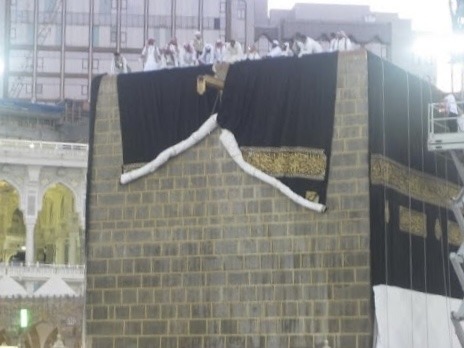
The kiswah also doesn’t have to be black. It’s a pretty firmly established tradition now but it’s been red, green and white at various times.
It has an inside. There’s nothing secret about it like the Holy of Holies, every year a bunch of dignitaries get to go in and clean it. There’s nothing material important in there, that being sort of the point:
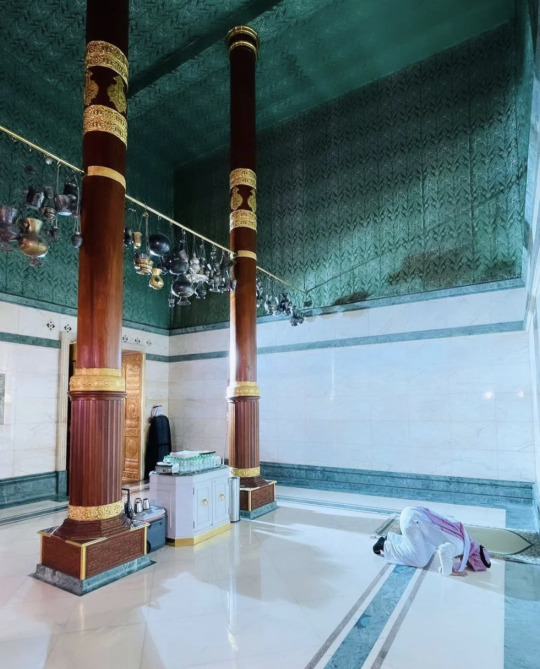
The little cabinet has cleaning supplies, perfumes and the like. If you pray inside the Kaaba you can face in any direction, plus I like to imagine you unlock a fun little achievement.
1K notes
·
View notes
Text
Elle Argent as Jesus Christ: Heartstopper art analysis.

Yesterday, I made this post where I wordlessly compared Elle's art piece for the Lambert School to the painting that draws her attention at the Louvre, Caravaggio's Supper at Emmaus, a depiction of Jesus breaking bread for his disciples after his crucifixion and subsequent rising.
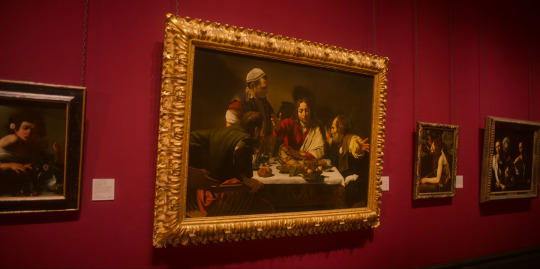
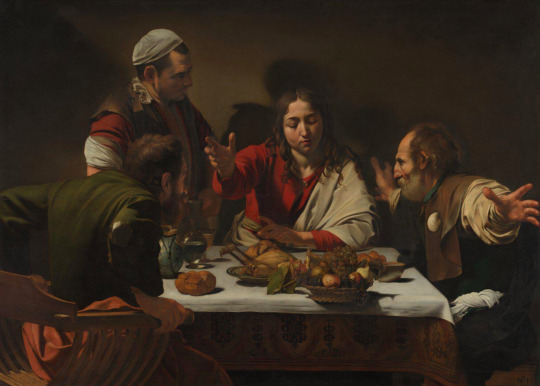
Elle's perspective on the painting / a full view of the painting (source)
The first thing I noticed that helped me draw the connection between these two paintings was their composition, the basic triangular lines that guide the eye in each painting; from Jesus and Elle in the center to the innkeeper and Tao at the top.
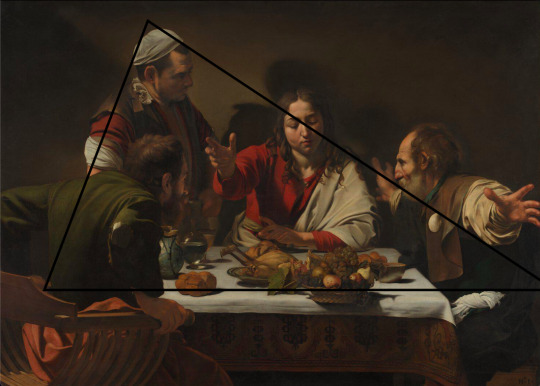

Heartstopper also clearly wanted us to make some connection between Elle and this Caravaggio: they focus on her face before they show us the painting, so we wonder what exactly it is she's seeing, which increases its narrative importance. I assumed she recognized herself in a painting; she did, but not in the way I expected.
The National Gallery (see above source) has this to say about the Caravaggio:
On the third day after the Crucifixion two of Jesus’s disciples were walking to Emmaus when they met the resurrected Christ. They failed to recognise him, but that evening at supper he ‘... took bread, and blessed it, and brake and gave to them. And their eyes were opened, and they knew him; and he vanished out of their sight’ (Luke 24: 30–31).
Painted at the height of Caravaggio’s fame, this is among his most impressive domestic religious pictures. He brilliantly captures the dramatic climax of the story, the moment when the disciples suddenly see what has been in front of them all along. Their actions convey their astonishment: one is about to leap out of his chair while the other throws out his arms in a gesture of disbelief. The stark lighting underlines the dramatic intensity of the scene.
Typically for Caravaggio, he has shown the disciples as ordinary working men, with bearded, lined faces and ragged clothes, in contrast to the youthful beardless Christ, who seems to have come from a different world.
Jesus, in the story, opens the eyes of his disciples in more ways than one (I pulled my Bible out for this!). First, in the scene depicted in the painting, the disciples do not know that this man is Jesus until he blesses the bread and breaks it for them, revealing himself as Christ. Second is the context in which Jesus comes to share dinner with his disciples: they meet him on the road during the day before, and he interprets the Old Testament for them: (stay with me I promise we'll leave the Biblical stuff and get back to the gay stuff soon)
Luke 24:13-16 Now on that same day two of [the disciples] were going to a village called Emmaus, about seven miles from Jerusalem, and talking with each other about all these things that had happened. While they were talking and discussing, Jesus himself came near and went with them, but their eyes were kept from recognizing him.
Luke 24:25-27 Then he said to them, "Oh, how foolish you are, and how slow of heart to believe all that the prophets have declared! Was it not necessary that the Messiah should suffer these things and then enter into his glory?" Then beginning with Moses and all the prophets, he interpreted to them the things about himself in all the scriptures.
If Safe Space is an exact analogue to Supper at Emmaus, then Elle takes the position of Jesus, and she draws from the story of Christ's crucifixion and rising a trans metaphor.
Death does not always mean death. For example, in the world of tarot, the card of Death does not signify literal Death, but a transformation: that the idea of death is a catalyst for change. If you're trans or non-binary, you understand the idea of the person you were being dead; that's why they call it a deadname. For me, the girl I was is dead. The person I am now, a living, breathing, non-binary person, is alive.
Jesus died and lived again; the boy Elle was died and the girl Elle is lived. Elle takes the spot of Jesus. Elle is risen.
There's another half to this metaphor: of the disciples that don't recognize Jesus. See where I'm going with this? At first, after Jesus had undergone his transformation, the disciples do not recognize him; literally "Their eyes were kept from recognizing him." The fault is not on them – it is another stronger force that maintains their blindness. But Jesus stays with them, despite the fact that they don't know who he is, and he talks to them about the scriptures.
We don't know much about Elle, pre-transition. But we know that Elle, Tao, and Charlie, at least, were friends before Elle's transition, and she had to come out to them at some point. So, in essence, she is Jesus on the road to Emmaus; unrecognized, a stranger, until she reveals herself for who she is.
She takes the moment Jesus tells his disciples who he is and shows what happens when Elle stays. We don't all have the luxury of being the Son of God, who can just pop away at a moment's notice after coming back from the dead (which is what he does, in the story: once the disciples have their eyes opened, he leaves). But this is Elle, out, resurrected, staying.
"So. There've been a lot of changes in my life over the last couple years. But with this piece I guess I wanted to capture a place that holds a lot of happy memories. Even in the darker times. Somewhere I always felt safe."
Safe Space comes after the moment of realization, after Elle comes out, after her friends' eyes are opened. But implied in its source and its inspiration is the moment of truth, the moment of coming out. There's been a lot of that, this season, coming out. There's people that want to and are scared, and people that refuse to and walk away. We never had to go on that journey with Elle. But she's telling us about it, now. She's telling us that it was glorious, that it was godly, that it was religious, that she died and was resurrected.
Before I leave, I want to touch on Tao's importance in this piece. The disciples in Supper are the two men that are seated; the man standing is the innkeeper, who is not quite a part of Jesus' world. Interesting, that Charlie and Isaac, the two people of Elle's group who are part of the queer community, take the place of the two disciples, and Tao, the token straight friend, is standing in the place of the innkeeper; not a follower of Jesus but a witness to the miracle of his resurrection anyway. They are all different people in this painting; different identities, different lives, different loves. But they were all there to witness Elle revealing herself in her resurrection. Tao, afraid of being left alone, is brought into this inner sanctum of Elle's world. Into her safe space.
#heartstopper#heartstopper spoilers#heartstopper analysis#heartstopper meta#elle argent#tao xu#charlie spring#isaac henderson#heartstopper season 2#my stuff#i am absolutely in love with this analysis#and i hope that everyone else likes it too!!!#userbarrow#userelletao
246 notes
·
View notes
Photo

The Letters of Paul the Apostle to the Gentiles
Paul was a member of the Jewish Pharisees in the 1st century CE, who experienced a revelation of the resurrected Jesus Christ. In this vision, Jesus commissioned him to be the apostle (herald) to the Gentiles (non-Jews). After this experience, he traveled widely throughout the Roman Empire, spreading the "good news" that Jesus would soon return from heaven and usher in the kingdom of God on earth.
In the New Testament, we have 14 letters traditionally assigned to Paul, but the scholarly consensus now recognizes that of the 14, seven were written by Paul:
1 Thessalonians
Galatians
Philemon
Philippians
1 & 2 Corinthians
Romans
2 Thessalonians, Ephesians, and Colossians remain debatable among some scholars. The other major letters (1 &2 Timothy and Titus) were most likely written by disciples of Paul’s, using his name to carry authority. The letters that have survived range between 52 and 60 CE, and although we cannot pinpoint when Paul’s letters were collected, Clement, a bishop in Rome in the 90s CE, quoted from 1 Corinthians.
The Nature of the Letters
We understand these letters to be circumstantial. They were not written as systematic theology or as treatises on Christianity. The letters are responses to specific problems and circumstances as they arose in his communities. Paul spent time in cities establishing a group and then moved on. He received letters and sometimes reports with detailed questions or advice on how to settle conflicts. Unfortunately, when Paul’s letters were saved and circulated, the original letters from the communities were not preserved. The reconstruction of the original problems can only be determined by Paul’s responses.
Known as the most famous convert in history (from the Acts of the Apostles), Paul did not actually undergo conversion. Conversion assumes changing from one religious system to another, but at the time, there was no Christian system for him to convert to. Paul himself was ambiguous when it came to his self-identity:
To the Jews I became like a Jew... To those under the law I became like one under the law (though I myself am not under the law) ... To those not having the law I became like one not having the law (though I am not free from God’s law but am under Christ’s law) ... I have become all things to all people. (1 Corinthians 9:20-22)
In relation to what happened to Paul, it is better to follow what he says, in that he was 'called'. This is the tradition of the way in which the Prophets of Israel were called to their individual missions.
I want you to know, brothers and sisters, that the gospel I preached is not of human origin. I did not receive it from any man, nor was I taught it; rather, I received it by revelation from Jesus Christ. (Galatians 1:11-12).
Paul argued that this experience gave him as much authority as the original circle in Jerusalem (Peter, James, and John). Paul’s call to be the Apostle to the Gentiles was shocking because, as he freely admitted, he had previously "persecuted the church of God" (Galatians 1:13). He never really explained what he did, nor why he did it. It is in Paul’s letters that the name Jesus is combined with Christ, the Greek for the Hebrew messiah ("anointed one"). Understood as a title, "Jesus the Christ", it became common as a phrase that indicated his identity and function.
Continue reading...
76 notes
·
View notes
Text
youtube
Please, please, please, come fast, Lord Jesus. Take us away from this world. I’m sorry for every sin I committed against you. Just please, have mercy.
#bible prophecy endtimes#end times#endtimes#jesus is coming#bibleprophecy#youtube#faith in jesus#follow jesus#time is running out#spread the word#coming of the third temple#pestilence#birth pangs#signs of the end times#wars and rumors of wars#jesus is returning#rapture of the church#jesus is the way#extreme weather#disease#stand fast in the faith#signs from god#time to repent#give glory to god#jerusalem#believe in jesus#you can be saved#war of gog and Magog#end of days#coming of the antichrist
0 notes
Text
"Peter William Pevensie!"
There was more fear in the cry than anger, but the boy was too young to tell the difference, and he flinched, but did not hide his face.
"Oh, Peter!" Softer she spoke, as she crouched down to lightly brush cool fingers over the bloody cheek, and the boy relaxed, grinned gamely.
"I'm alright, Mummy. Was just James, got me with his sword."
*
Peter, from the Greek Petros/Petra, meaning rock, stone. The name bestowed by Jesus, who is called Christ, on His disciple Simon (bar Jonah).
"And I say also unto thee, That thou art Peter, and upon this rock I will build my church; and the gates of hell shall not prevail against it."
One of the first disciples of Christ, denied his Lord three times, saw the Christ after His resurrection, received forgiveness, lead the early church from Jerusalem, died a martyr's death upon an upside-down cross.
*
"And that explains why your shirtsleeve is gone, hmm? And this tear in your knickerbockers, I suppose."
Her hand was gentle on his hair, and he sighed, proud of the way his arms hurt, his knee ached, the taste of blood that still lingered on his tongue. He was a knight, after all, like King Arthur. He had friends to protect, and battles to fight. Wounds were things to be proud of.
"Did you fight honourably?"
He looked up into his mother's face, and her eyes told him this was important, even as her lips smiled.
Peter knew what 'honourable' meant; Daddy had told him. It meant not hitting a girl, and not hitting a boy when he was down, or hurt, or smaller than Peter. It meant being fair, and not cheating. It meant being kind, even to people he didn't like.
He nodded. "I think so. Least, I tried." He had almost taken an extra swing at Billy, after the other boy had lost his sword, but James had stepped in front of him, and made sure Billy got his wooden weapon back, before the fight continued.
"Good." Mummy's whole face looked happy then, and she stood up straight, took his hand. "Come along then, and we'll clean you up."
*
William, from the Germanic, will-helm, or more often rendered resolute protector. The name of England's first Norman king, 'William the Conquerer', as well as that of Scotland's guardian, William Wallace.
Of Wallace: "He was appointed Guardian of the kingdom not so much by election as by divine intervention..." — Walter Bower
Also the name of that prolific playwrite and poet, William Shakespere, and of England's passionate abolitionist, William Wilberforce.
*
Peter followed obediently, only slowing as they passed the baby's bassinet on the way to the kitchen.
"He's asleep," his mother said quietly, "Don't wake him."
Peter was quiet, glancing back as he stood by the table, while Mummy fetched a rag, wet it at the sink.
"Will Eddie be able to play with me soon?" he asked at last. "I know he's still small, but he'll get strong soon, won't he?"
There was a little pause, before his mother came toward him with the cloth, and with a smile, picked him up and seated him on the edge of the kitchen table. He dangled his legs, delighted, but not distracted.
"Won't he, Mummy?"
"Oh, I expect so." The rag brushed his cheek, and he couldn't help squeaking, just a little. "He'll be out there in the street with you before I can turn around." She stopped wiping away the blood for a moment, and looked him in the eye, quite serious. "You'll still need to watch out for him, you know. Even when he's bigger. You're already so sweet with him, but try to keep being kind, always. Try to remember that, alright?"
Peter looked back at her, feeling like he was a knight being told something very important by the queen. "Yes, ma'am."
"Good child." She kissed his forehead, and went back to the work of cleaning his cuts.
Peter sat as still as he could, only swinging his legs gently, careful not to kick his mother, going stiff whenever a fresh burst of pain came.
She was cleaning his knee when Susan started in roaring from the nursery upstairs, and almost at the same moment, Ed gave a little cry.
"Oh, dear." His mother made a face, something he didn't usually see grown-ups do, and she lifted him down to the floor. "Peter, dear. Try to keep the baby quiet while I fetch Susie?"
"Yes, Mummy."
Peter didn't mind being told to look after Eddie, he liked his baby brother. Peter was tall enough to rest his arms on the edge of the bassinet, and he leaned in, murmuring gentle things like Daddy did.
"Hullo now, Eddie. It's alright, little fellow. I'm here. Big brother's here."
The thin mewing noise stopped, and dark eyes peered out of the pale face at him.
"Don't worry, Mummy will be back soon, she just has to get Susie."
Peter put out one hand, knuckles still scraped and red, dirt still under his fingernails, and stroked a gentle finger down the baby's cheek.
"That's right. Big brother's here. You're alright, Eddie."
He was surprised by the force with which the tiny fingers wrapped around his, but then he grinned, delighted.
"See, I knew you were getting stronger! It'll be just as Mummy said, you'll come playing with me in no time. And I'll let you have my best sword, I can make a new one. I'll teach you how to fight, don't worry."
The little blond boy was still talking when his mother came down the stairs, holding her now mollified second-born, and she stood for a moment, watching and smiling, a deep sudden gratefulness welling up in her heart. He would be well, Edmund would. How could he not with such a loving protector as Peter?
#yes i am gonna make this a quick series on their names#seriously though PETER WILLIAM PEVENSIE is the PERFECT name for that boy#peter pevensie#my writing#narnia fanfiction#chronicles of narnia#narnia
52 notes
·
View notes
Text
The Gish Gallop was a term coined I think on the 2000s internet for a rhetorical maneuver where to buttress an argument you provide a ton of low-quality evidence; that the evidence is bad means it should be easy to refute, but the very large volume means it will take much longer to explain why it's all wrong than it did to copy-paste a bunch of links, and to a certain kind of very naive onlooker, it looks like the galloper is winning--after all, the one interlocutor has presented a ton of evidence! The second interlocutor has to spend so much time bending over backwards to refute it! Surely the first guy is more knowledgeable and authoritative. You aren't going to look at all that evidence yourself, of course--who has the time?
But listening to Dan McClellan talk about the Gospel of John this morning, it occurs to me that I don't think this is disingenuous. Not entirely. I think this is just the style of argumentation a lot of Christians (of a particular religious flavor) are used to. And I'm not just talking about in non- or para-religious matters like evolution. This is how Christianity understands the Bible.
This week's Data over Dogma is about the theology of John, and why it is non-trinitarian (because the Trinity is a much later doctrine developed as a kind of political compromise, maintained only because it had state backing) and does not actually identify Jesus with God (the theological developments are more complicated here; but suffice it to say it was not at all a given that "authorized bearer of the divine name" and "actually God" were the same being in 1st century Hellenistic Judaism, and indeed the distinction between the two had developed in Jewish thought precisely to avoid the awkwardness of anthropomorphic figures proclaiming themselves God in some of the older sections of the Hebrew Bible).
The funny thing is, there are a ton of passages in John that get trotted out as proof texts that Jesus is God. There are very good reasons in the case of each one to doubt that that is actually the correct reading; but of course, if you don't know anything about Greek, all you have are modern translations produced under the assumption of the dogma of the Trinity--mostly for devotional readers of the Bible who would be outraged if the Trinity wasn't in the New Testament--and you have been raised in a cultural and/or educational milieu where it is simply a default assumption about the way the world works that the Trinity is a timeless concept that has been in the Bible from the beginning, it sure looks like one side is spinning up tendentious arguments based on silly semantics that have nothing to do with the religion you learned as a kid.
But this exegetical approach (really, eisegetical) is common to many topics in traditional Christian theology. There are a ton of passages from the Septuagint that the Gospels warp to be about Jesus, even though, in their original context, this doesn't make any sense; sometimes even they're based on obvious mistranslations, like having Jesus ride into Jerusalem on the back of two animals simultaneously because you don't understand appositives. And you can poke holes in any individual bit of this exegesis, but psychologically having a ton of low-quality evidence for a thing is a pretty effective bulwark against thinking critically about that evidence; for every individual argument you knock down, the person you are arguing against is probably thinking, "yeah, but what about all that other stuff," even if they can't actually name all that other stuff in the moment.
And it's not mendacious! This is the stuff of true belief; this is how you get breathless Christian commentators saying the Bible couldn't possibly be written by human hands, because it so perfectly predicted Jesus even in the Old Testament--and the evidence they point to is, to anyone not steeped in traditional Christian exegesis, and especially to Jews who have their own exegetical traditions, absolutely barmy. Like really pants-on-head crazy stuff. But of course even now it is still being processed, in many parts of the world, through a two thousand year old tradition trying to reconcile it all and to normalize it all, and--to bring it back to discussions of evolution on the internet in the 2000s--I can't help but think of all those people who talk about the experience of thinking evolution was so obviously nonsense, because all they were exposed to was the fundamentalist strawman of it. When they finally sat down and began to read about it on their own, from unbiased sources--often with the intent of criticizing it--they realized how distorted their understanding was, and how limited their supposed outside view.
(If there are general lessons to be wrung from this situation, I think it's simply "beware of echo chambers." Social consensus in a bubble can make bad arguments feel much stronger than they really are, especially if you are not exposed to the actual opposing view. Be on guard against mistaking "quantity of evidence" for "quality of argument," especially if you're not gonna evaluate that evidence yourself. Also all religious traditions are fundamentally eisegetical, because in order to keep holy writ relevant to the community its meaning has to be constantly renegotiated. So, uh. If you want high-quality exegesis, ask an academic, not a theologian.)
92 notes
·
View notes
Text
Coffee theory, Lie theory, Body-swap theory, Az has trauma theory—-
I propose my good people: ALL OF THEM
S2 Good Omens Spoilers ahead as well as s3 predictions

Let’s start with the first and most common: the coffee theory.
Coffee theory is simply that Metatron did something to Az’s coffee to make him agree to leave Crowley and go up to heaven.
Now there is no denying that coffee has played a suspiciously conspicuous role throughout this season. From the coffee shop (oh we will come back to the coffee shop at the end my friends, don’t you worry), to Crowley’s espresso order, to Metatron’s suspicious offering, and the coffee cup making an appearance in the opening sequence.
I am never one to cast aside what writers are so obviously trying to shove in an audience’s face.
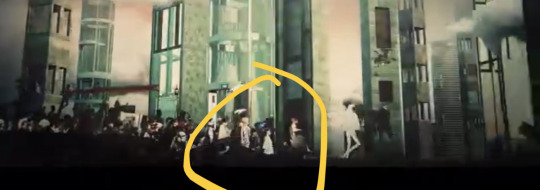
Do I think that Metatron drugged Az’s coffee in some way? Not really no- I believe coffee might be a symbol for sun here, almost Az’s own Apple as it were.
Throughout the show we have never seen Az drink coffee, only Crowley and humans, both of who are capable of sin. (Also Crowley chugging down 6 shots?). Az drinks tea (unspecified) and offers hot chocolate, but never coffee.
Coffee has no biblical ties- BUT in LSD/Mormonism has a rule against it.
This stance dates back to 1833, when Joseph Smith Jr., the founder of the Church, received what he called “a revelation from God” that said: “hot drinks are not for the body or belly.” -source
Shortly after this “rule” it was updated to allow herbal teas, and in modern times hot chocolate.
Now why would a Mormon rule apply here possibly? Because I believe it may apply to s3. The initial planned sequel to the book has been said to pertain to the second coming of Jesus in America.
After Jesus' resurrection, according to the Book of Mormon, he visited America. In fact, America plays a special role in Mormonism. Mormons believe that when Jesus returns to Earth, he will first go to Jerusalem and then to Missouri. -source
The Book of Mormon references Jesus visiting America- and I don’t think the writers would make one silly tie in and just leave it at that. If we’re saying they’re right on one prophecy, why not add this to it?
I find it silly and impossible to believe that our little human food lover has had it all but was unfamiliar with how espresso would effect him. I also find it highly suspicious how much of the marketing revolves around the beverages our characters drink.

I do believe there is also stock in the almond syrup as everyone else has pointed out.
In context, God had just given Israel a warning. “I have this day set you over the nations and over the kingdoms, to root out and to pull down, to destroy and to throw down, to build and to plant.” (Jeremiah 1:9-10) Then after Jeremiah sees the almond tree, God shows him a boiling pot over Jerusalem which portends “calamity”. (Jeremiah 1:13-14) While the almond is a sign of hope that God will eventually fulfill His wonderful promises to Israel (or to us), the context is more ominous. Later, God repeated the warning through Jeremiah: “Behold, I will watch (shaked) over them for evil, and not for good…” (Jeremiah 44:27). God’s message to Israel was that sin has consequences and there will come a time of reckoning – namely the destruction of Jerusalem and the captivity of Israel. Years later, Daniel would pray: “Therefore has the Lord watched (shaked) upon the evil, and brought it upon us: for the Lord our God is righteous in all His works which He does: for we obeyed not His voice.” (Daniel 9:14) -source
That last bit really gets me because Metatron is the voice of god as we know. So the coffee is a combo threat as well as a type of temptation, like the apple. (“Are you going to take it?”) We know that in the s2 opening we see Adam’s (of the garden variety) grave and we are supposed to learn about his death in s3. I think Az falling to temptation will tie into all that.
Back to the moment in question- a lot of people pointed out a miracle sound occurring faintly when the Metatron handed over the coffee. It’s been floating around that this was him doing something to the coffee .
I disagree- I think that was Crowley protecting Az. We don’t see him immediately in that shot- and him being on the other side of the room would be why it was so faint. Metatron’s glare wasn’t one of pure dislike- he sensed something then and was suspicious.
Crowley is overprotective on a good day- but he knows Metatron and does not appear to hold and fondness to him. I think he knew no good was to come from the conversation and wanted to protect Az of anything that could occur. So the coffee didn’t actually end up effecting him at all.
All that summed up to say: coffee theory doesn’t tell us why Az does what he does- but it does tell us why Metatron thinks everything is working out in his favor.

Next up! Az is just traumatized theory
It has been pointed out that Az’s decision in this moment is actually pretty on brand for all that he’s been through. And I would agree!
Of course he wants to be in heaven’s good graces, of course he wants to fix the world-save the humans- overhaul the system, of course he is still seeking validation.
That’s why when offered the position he jumps at it! No mind inducing coffee needed like the Metatron had thought. It’s just that what Metatron doesn’t know is that Az is agreeing with his own motives in mind. He wants to make a world safe for humans, he wants to make a reality safe for him and Crowley, and he wants to come back to his bookshop at the end of it all.
All that summed up to say: Az trauma theory tells us why he decided to take this path- but doesn’t explain the offer itself (coffee theory did that), or why he presents it the way he does
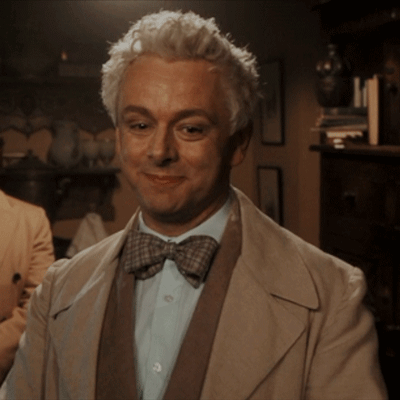
Next: The Lie Theory
This theory comes based around the idea that Az is lying to both Metatron and Crowley.
This season taught us something very crucial about angels in general and our favorite, Az. It showed us that angels are not supposed to be able to lie- and that Az willingly does on multiple occasions.
Lying is definitely a big deal in the Bible. It is one of the Ten Commandments in fact.
One of the Ten Commandments is "thou shalt not bear false witness against thy neighbour"; for this reason, lying is generally considered a sin in Christianity. -source
It is no small thing that Az commits this sin- although I’m sure he puts himself through all sorts of mental gymnastics to do so. From what we can tell, he only does so to protect. In this case, we can assume he is trying to protect Crowley.
The lie in theory is that during the secret conversation with Metatron, some sort of threat against Crowley may have been made or that Az simply needed to figure out a way to drive Crowley away from him (or possibly goad him).
So when Az is telling Crow that he can be an angel again, this is a lie knowing that he would never go for it. Then when he reports back to Metatron he lies (by omission) what he actually relayed over to Crowley.
Why such a harsh lie though? Why hurt Crowley so deeply- surely there are other ways to push him away from danger.
Because he was trying to goad him- he was trying to rile him up.
So to summarize: The Lie theory tells us why Az delivers his news how he does- but not to what end

Now: The Bodyswap Theory
Bodyswap theory is essentially that Az and Crow switched bodies again during the kiss to go about and solve the issues at hand.
Now we know from s1 this is possible- but I don’t exactly think that’s what happened. We learned this season that angels also appear to have the ability to store memories or consciousness ~elsewhere~ and that both of these seem to require physical contact to occur.
What I believe happened here was that Az transferred some sort of information to Crow (a memory- what happened in the conversation-etc). That’s why kiss was, uh, not quite so quick and chaste and why Az was goading Crow in the first place. Also possible Crow transferred some knowledge (or abilities) back.
We have seen that Crowley is actually rather easy to rule up- and that Az has succeeded in doing so multiple times.
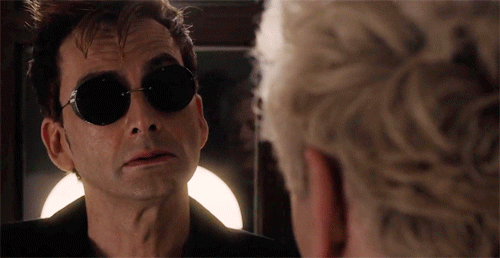
I don’t think Az was expecting a kiss (poor soul)- but he was expecting to be grabbed or something.
To summarize: Bodyswap theory explains why Crowley didn’t immediately burn the world to the ground

Now looking ahead to s3 and my own silly theories off of all of this. Aka: gentleman start your engines theory
This theory will hopefully explain those last few painful moments.
“I forgive you”
“Don’t bother”
For what? The kiss? The not going to heaven? All of it?
No- for what Crowley is about to do. Aka raise hell on heaven.
Whatever information Az passed along- Crow’s response was some sort of inkling of a plan towards destroying heaven and the system as we know it. A revolution of sorts.
The revolution has been hinted at since the end of s1- ever since our precious coffee shop sprang into existence (told you I’d get back to it).

The quote that the title of the shop is referring to is “Give me liberty or give me death,” from founding father Patrick Henry’s famous speech credited with swinging public favor to join the American revolution (America, the convenient location of our second coming) during the First Virginia Convention at St. John’s Church.
I know of no way of judging of the future but by the past. And judging by the past, I wish to know what there has been in the conduct of the British ministry for the last ten years to justify those hopes with which gentlemen have been pleased to comfort themselves and the House. Is it that insidious smile with which our petition has been lately received? Trust it not, sir. Suffer not yourselves to be betrayed with a kiss. Ask yourselves, are fleets and armies necessary to a work of love and reconciliation? Let us not deceive ourselves, sir. These are the implements of war and subjugation; the last arguments to which kings resort. I ask gentlemen, sir, Has Great Britain any enemy, in this quarter of the world, to call for all this accumulation of navies and armies? No, sir, she has none. They are meant for us: they can be meant for no other. And what have we to oppose to them? Shall we try argument? Sir, we have been trying that for the last ten years. Sir, we have done everything that could be done to avert the storm which is now coming on. We have petitioned; we have remonstrated; we have supplicated; we have prostrated ourselves before the throne, and have implored its interposition to arrest the tyrannical hands of Parliament. Our petitions have been slighted; our remonstrance’s have produced additional violence and insult; our supplications have been disregarded; and we have been spurned, with contempt, from the foot of the throne! In vain, after these things, may we indulge the fond hope of peace and reconciliation? There is no longer any room for hope. If we wish to be free, we must fight! I repeat it, sir, we must fight! An appeal to arms and to the God of hosts is all that is left us! It is in vain, sir, to extenuate the matter. The war is actually begun! Our brethren are already in the field! Why stand we here idle? Is life so dear, or peace so sweet, as to be purchased at the price of chains and slavery? Forbid it, Almighty God! I know not what course others may take; but as for me, give me liberty or give me death! -source
Another fun historical fact- this church also helped pave the way for religious freedom in America. (But also had a very messy history).
It is notable that the Second Virginia Convention authorized Baptist chaplains to minister to soldiers, an important early step toward freedom of religion in what became the Commonwealth of Virginia. Baptists and Methodists had been influential in Virginia during and following the Great Awakening, and many of the common people had already become affiliated with Baptist and Methodist congregations. -source
We also what seems to be a militia of sorts marching to heaven in the s2 opener with all sorts of walks of life. This isn’t going to be the heaven vs hell war- it’s going to be a revolution.
We see repeatedly when Az forgives Crow it’s almost reactionary. He wants Crow to know he doesn’t condemn his actions (and therefore also agrees with them to some extent).
Crow says “don’t bother” not because he’s dismissing Az, but because the very system that the forgiveness is based on he seeks to overturn.
This planned revolution is also why we get the “no nightingales” line.
Now the: No Nightingales Theory
Now, we are meant to think it’s just a heartbreaking reference to the song “a nightingale sang in Berkeley Square” but it’s so much more.
Nightingales are mentioned one time in the Bible- well the Old Testament has them at least, in the Song of Songs.
"Behold the autumn has passed, the rain has gone, blossoms are seen in the Land, the time of the nightingale has come, the voice of the turtledove is heard; the fig has formed its first fruit; the vines in blossom give forth fragrance", Song of Songs 2:11-13. These verses describe springtime in the Land of Israel. The rains have ended, the trees are in blossom and the nightingale has come. Israel is located on the migratory route between Europe and Africa, of so many birds, including the nightingale and the sweet sound of the birds can be heard from within the shrubbery. -source
The Song of Songs is described as, “a literary, poetic exploration of human love that strongly affirms loyalty, beauty, and sexuality. Yet in God's story, these things are not ends in themselves.”- Tom Gledhill.
Both this and the song “a nightingale sang in Berkeley Square” reference a nightingale symbolizing the coming of spring after winter.
Nightingales have a long history in British literature having a general theme of representing nature's purity, and, in Western spiritual tradition, virtue and goodness.
In Romeo and Juliet, they help represent the opposing sides of light and dark in love
In the same way that light and dark are mutually exclusive, Romeo and Juliet are like nightingales and larks, never able to be together. The lark, a bird of the morning (light), represents harsh reality, while the nightingale represents the safety of night (darkness). -source
In John Keats “Ode to a Nightingale” he references the battle between logic and passion- “The nightingale described experiences a type of death but does not actually die. Instead, the songbird is capable of living through its song, which is a fate that humans cannot expect. The poem ends with an acceptance that pleasure cannot last and that death is an inevitable part of life.” -source.
We also have this lovely tidbit from Izaak Walton’s (famous British author) essay.
But the nightingale, another of my airy creatures, breathes such sweet loud music out of her little instrumental throat, that it might make mankind to think miracles are not ceased. He that at midnight, when the very labourer sleeps securely, should hear, as I have very often, the clear airs, the sweet descants, the natural rising and falling, the doubling and redoubling of her voice, might well be lifted above earth, and say, “Lord, what music hast Thou provided for the saints in heaven, when Thou affordest bad men such music on earth?”-source
This references the shortcoming of heaven and the beauty of what sinners may find on earth again via the nightingale.
All this to say- Crowley’s “no nightingales” may be a way of saying “spring is not here, we are still in the trenches, I love you-but cannot protect you where you are going now.”
Still sad! But like- less break up sad, more the reality of the situation they’re entering sad.
Also- back to Walton’s piece- the questioning of god again—
Speaking of god… where is she
And finally: God is Dead- a not fully formed theory
Did anyone else notice god did not narrate this season? Not to go all “his dark materials” on y’all, but did someone kill god?
Odd artistic choice to just remove her so suddenly.
I just keep circling back to Metatron’s question in the coffee shop, “does anyone ask for death?”
At first I thought he was referring to Job- who’s story we got to tackle this season, as in the Bible he actually mentions asking for death several times.
But then it got me wondering- did god ask for death? If so was it because the ineffable plan failed?
Also the inclusion of Iain Banks, ‘The Crow Road’ that Metatron gives Muriel can’t be for nothing. (Spoiler of for book-but it’s loosely a murder mystery with a solid grappling with faith).
Part of me also wonders if Crow is suspicious of all this- just based off the faces he was making around Metatron. Also because of Gabriel just throwing everything away suddenly- and him referencing the second coming.
I don’t have a fully formed analysis of this theory- it’s just growing in my head.
ANYWAYS- in summary: Metatron tried to trick Az with the coffee, but crow protected him, and it wasn’t necessary anyways because Az has trauma, but still wants to protect Crow so he lied and riled him up to transfer knowledge, and Crow has decided to raid a revolution but is being a romantic drama queen about it, and god might be dead. :)

#good omens#good omens s2#ineffable husbands#ineffable idiots#aziracrow#aziraphale#crowly x aziraphale#crowley#metatron#coffee theory#lie theory#body swap#bible fanfiction#writers on tumblr#theories#amazon#gratuitous research#neil gaiman#go2#go2 spoilers#go2 speculation#michael sheen#david tennant#good omens season 2#good omens season two#good omens shitpost#good omens spoilers
158 notes
·
View notes
Text
The Altar of Eccles Cakes
(updated 21 Oct 2023, for Grain Offerings example)
(updated 21 Nov 2023, for link to First Temptation)
The mysterious plate of Eccles cakes. Are they really to "calm people down?' And why do they just ...disappear? They must be there for a reason?
Yes, they certainly are. They are just the first course of a fascinating meal on offer in S2.
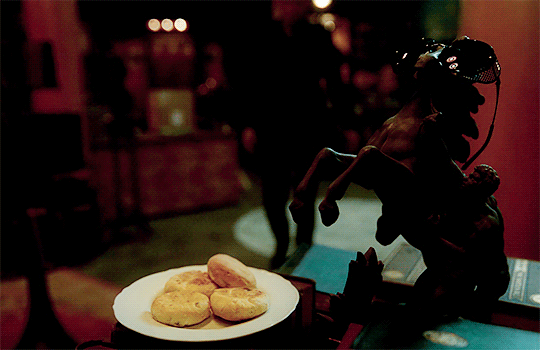
So far, most of the meta around the Eccles cakes has focused on the meaning of their name. Eccles is an old name for church. We could view it as Aziraphale trying to calm Crowley down. They are also known as "squashed fly cakes." The white outside and the black inside could be seen as a metaphor relating to Gabriel. Or it hints at the Roger the Stunt Fly, that contain Gabriel's memories, flying around the book shop, who's purpose we don't find out about until the end. There is even a link to the 1650 Sorry Dance that Aziraphale mentioned, in that were banned by Oliver Cromwell for being pagan! (Did I get that right? I've not kept the post link.)
[Edit: They also represent the First Temptation as Jesus fasts in the wilderness for 40 days before the Entry into Jerusalem at the start of the Passion narratives, where bread was made from stones.]
Take another look at the blocking in this shot. The dark horse statue, representing Crowley - even wearing his sunglasses! - has the placating plate of Eccles cakes placed before it, in supplication. Yeah, it didn't work this time, but it's the thought that counts. What we have here is Aziraphale making an Sin offering to the altar of Crowley, to ask for atonement in advance for what he has done (taking Gabriel in.)
Once you frame it in that reference, you realize its not the only altar offering made during S2. It also adds a bit more depth to some of the other scenes, where they have all been mentioned already in some way, but it certainly helps to explain the Eccles cakes!
Firstly, we need to mention the main types of altar offering that are made:
Burnt offerings - for general atonement of sins and for expression of devotion to God. It could be a bull, a ram, goat, or a bird in the form of a dove or pigeon. Such as this magnificent example in the Job minisode.
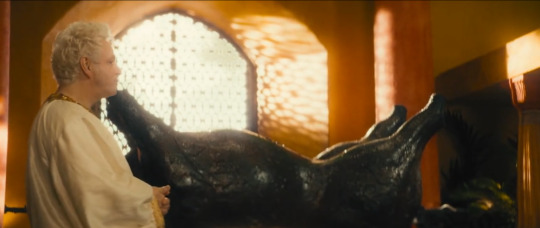
Aziraphale certainly devoted himself to the sin of gluttony on that occasion. (hang on, that didn't come out the right way, did it...?) But he was still devoted to God, despite his nocturnal conversation with Crowley while they waited out the storm in the cellar.
Grain offerings - a voluntary expression of devotion to God. This was grain prepared in different way, but always seasoned, unsweetened and unleavened. Recall at Gomorrah Lot offered to prepare the visiting angels unleavened bread as part of a meal.
Originally when I wrote this post I didn't think I had any Grain offering examples, but a few days later as I was writing my post on The Ineffable Ducks I realized where the missing S2 Grain offering was - in S2E1, when Crowley yells at the Azerbaijani spies in St James Park. The ducks are usually offered bread, which is leavened with yeast, so technically not quite correct, but when you review all the instances of feeding the ducks crumbs or bread crumbs it certainly fits. Unless you are Crowley, and you'd rather have the current state of quiet "frozen peas" between Heaven and Hell. See my Ineffable Ducks post for an elaboration.

Peace offering - This could be cattle, sheep or goat without defect, but the main purpose to was consecrate a meal between two or more parties before God and share that meal in a fellowship of peace and commitment to each other's future prosperity.
You know where we see one of these? At the eldritch ball!
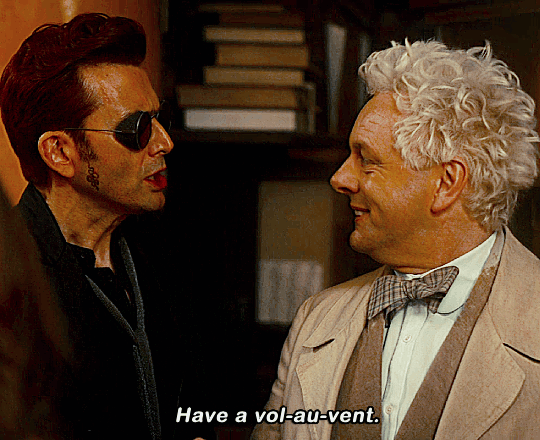
I did see a nice meta about the vol-au-vents recently, mainly about their name, but I don't seem to have saved it, and can't find it again. They are usually filled with chicken (a bird) and the eldritch ball is ostensibly the shopkeepers monthly meeting, after all, where they are there to talk about their mutual prosperity in the future. Just so happens its also an opportunity for Aziraphale to talk to Crowley about their future...oh, and Nina and Maggie's, as well, of course!
Sin offering - atonement or unintentional sin. It would have the elements of a Burnt offering, as well as a Peace offering, but not be shared. These are what the plate of Eccles cakes are, so they were never meant to be eaten. They were an olive branch to Crowley regarding Gabriel, but he turned it down. So they softly and suddenly vanish away, never to be met with again.*
There is one more altar offering that needs to mentioned, another Sin offering. The one Crowley consumed in Elspeth's place in The Resurrectionists minisode in 1832 Edinburgh - the laudanum.
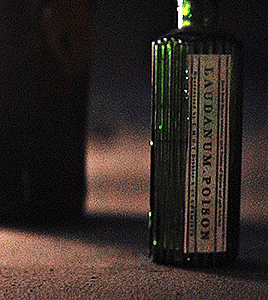
It pretty clear to most observers that Crowley did a good and "kind deed" for Elspeth here, which angered Hell in the process and then he was dragged forcibly downstairs to be duly punished for it. There is a post here from atlas-hope that suggests this is a parallel of Jesus in the Garden of Gethsemane, drinking the cup of God's wrath to absolve Christians of their sins. They point out the laudanum is even poured into a goblet. Crumbs, that's a hefty bit of spiritual lifting, dear demon. What were you thinking, Anthony J. Crowley? It might cast that conversation you had with the carpenter back on the mountain in a new light, or least make us look back twice at it. (Plenty of time for contemplation before S3 arrives...)
Remember, a Sin offering has elements of both a Burnt offering and a Peace offering: a giant Crowley gets Elspeth to promise to devote the rest of her life to being "properly good, not just pretendy good" and the money Aziraphale is forced to donate to her ensures her future prosperity. Sounds like a win-win situation there, Elspeth!
[*OK, if you don't get the ref, its from the Hunting of the Snark. The Snark represents happiness, a most elusive thing to find, and more often than not its a fruitless search, and you find the terrible Boojum instead. During the third verse the Baker recounts the lecture his uncle gives him about how to hunt the Snark, and to be aware of his fate if he is unlucky enough to encounter a Boojum. It kind of fits in with S2, I feel.]
#good omens#good omens 2#good omens meta#aziraphale#crowley#a companion to owls#the resurrectionists#job minisode#elspeth#laudanum#constitution of an ox#crucifixion pose crowley#altar offerings#Fit the Third: The Baker's Tale#Eccles Cakes#I'm sure the Baker would have baked a few Eccles cakes in his time before he embarked
102 notes
·
View notes